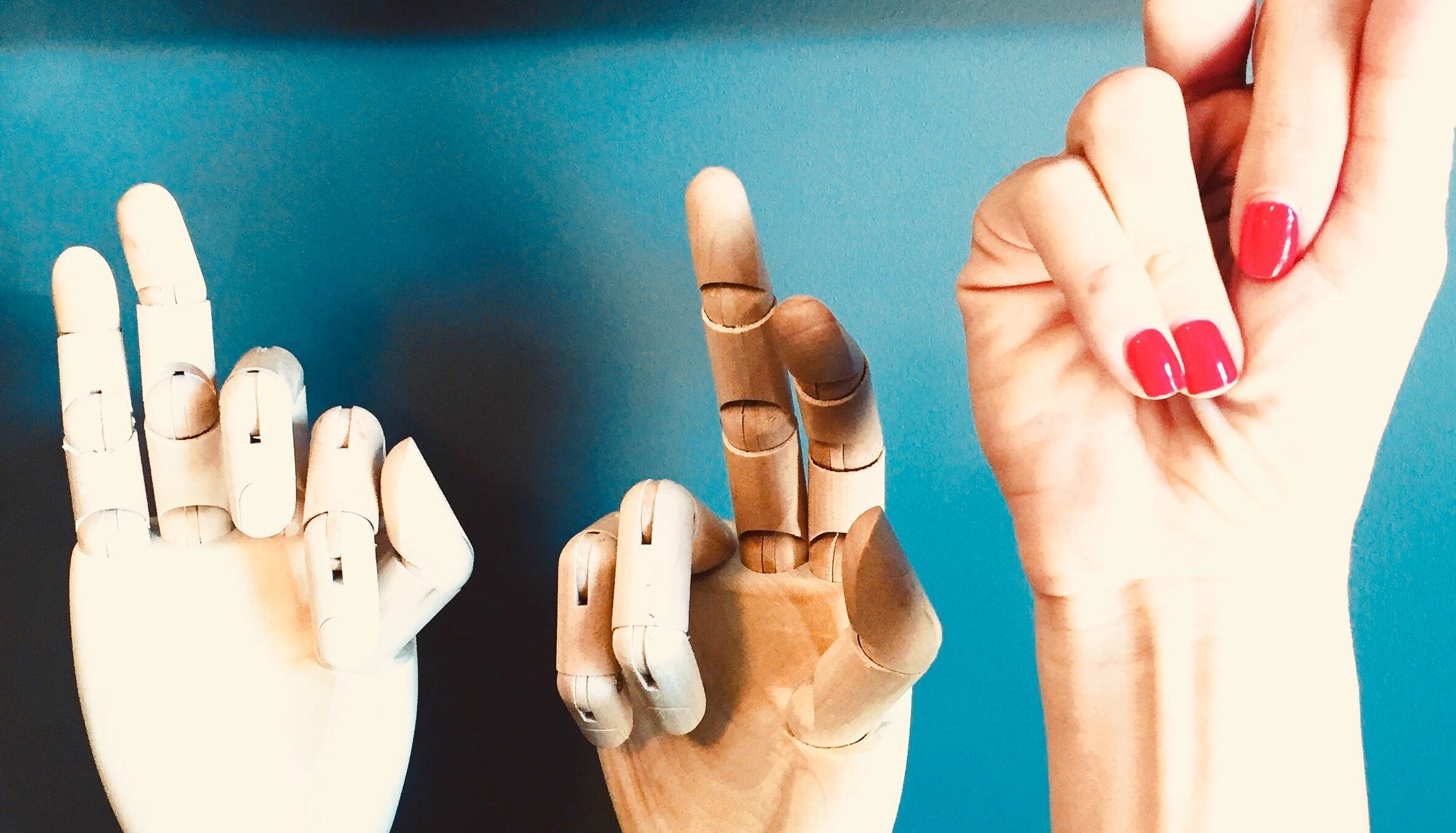What is the human spark that enabled us to conquer the world?*


The world is populated mainly by humans and their domesticated animals. In Germany, the land of Grimm brothers, Litlle Red Riding Hood and the Big Bad Wolf live less than a hundred wolves. In contrast, Germany is home to 5 million domesticated dogs. Altogether, there are 200,000 wolves worldwide, but more than 400 milion domesticated dogs and 20 billion chickens. At present, more than 90% of the large animals of the world (weighing more than a few kilograms) are either humans or domesticated animals.
How come that Homo sapiens became the single most important agent of change in the global ecology of the last 70,000 years? Our impact is comparable to that of ice ages and tectonic movements.
Based on anthropological and archaeological evidence, our archaic hunter gatherers were probably animists: they believed that there was no essential gap separating humans from other animals (Nayaka people, who live in the tropical forests of south India still believe so). Such animistic mentality is simply unacceptable nowadays, when we consider ourselves different and superior to animals.
The only animistic story appearing in the Bible is the famous scene of Eve being tempted by the serpent in the Garden of Eden. The conclusion? You shouldn’t listen to snakes and it is generally recommeded to avoid talking to animals, it leads to nothing but disaster. The Bible, along with its belief that humans were divinely created from inanimate matter was one of the by-products of the Agricultural Revolution. Another by-product was the new human-animal relationship, in fact a completely new life form on earth: domesticated animals.
As of the Agricultural Revolution, human desires were in opposition to the animal subjective needs. Emotions are not a uniquely human quality, they are common to all mammals, as well as to all birds, some fish and reptiles. Emotions are biochemical algorithms that are vital for the survival and reproduction of all mammals.
In fact, organisms are algorithms. What we call sensations and emotions are in fact algorithms. It is therefore likely that frightened humans , frightend baboons and frightened pigs have similar experiences.
The Agricultural Revolution brought new type of religions: the theist religions, a script with just two main characters: man and God. Animals were left aside. Gods had two roles:
1. the first one was to explain why humans should dominate all other species: they were specially created by God to have this role. Moreveover, they were given eternal souls, by opposition to animals who were given no souls
2. the second one was to mediate between humans and the ecosystem . While in the animistic religions everybody was talking to everybody, be it human, animal or plant, in the new ones, the non-humans were silenced. The silence of the lambs…
The rise of modern science and industry was the perfect setup for a one-man show. Humankind stood alone on an empty stage, acquiring enormous powers without any obligations in return. If somebody in the dairy industry wants to produce milk, he/she neither talks to the cows, nor he/she prays to God. He/She simply goes to the R&D department to studiy genetics and the genes don’t ask for anything in return.
What if, in next tens of years, the AI will be the new superhumans and we Sapiens will take the role of animals and plants? Are we ready to be on the other side of suffering?
Besides higher intelligence and greater power, do humans have a magic spark? And if yes, can it be copied by an AI?
What is this unique human spark?
1. The traditional monotheist answer is that only Sapiens have eternal souls. This is a myth shaping the lives of billions of humans. The belief that humans have eternal souls while animals are just evanescent bodies is a central pillar of our legal, political and economic system. However, if we ask scienties who pursued thousands of bizzare experiments, they will say they have zero evidence that in contrast to pigs, Sapiens have souls.
2. Natural selection would say Charles Darwin, who deprived us of our souls. According to a 2012 Gallup survey, only 15% of Americans think that Homo sapiens evolved through natural selection, free of all divine intervention, while 46% believe that God was in charge; The same survey found that between holders of MBA and PhD , 29% credit natural selection, while 25% believe the Bible.The evolution theory states that there is no indivisible, immutable and potentially eternal essence. By the contrary, all biological entities are composed of smaller parts that constantly combine and separate. If you really understand the theory of evolution, you understand that there is no soul. How come that so many people believe in it?
3. Out of all animals on earth, only Homo Sapiens has a conscious mind. While the existence of the soul is a matter of debate, the stream of consciousness, by contrast is surest thing in the world. Any conscious experience has two fundamental characteristics: sensation and desire. Feel and crave. What about a horse? Is it ok to force it to work until he collapses from exhaustion? The father of modern philosophy, Rene Descartes maintained that only humans feel and crave, whereas all other animals are mindless automata. Still, to these days, science has no absolutely idea how 80 billion neurons connected into numerous webs produce specific subjective experiences. 99% of bodily activities take place without the need of conscious feelings. So, why do the neurons, muscles and glands need such feelings for the remaining 1% of the cases? Little we know about the mind!
4. Still, in May 2015 New Zealand became the first country in the world to legally recognise animals as sentient beings, following Cambridge Declaration of Consciousness in 2012. In a country with far more sheep than humans that is a very signifcant statement.
5. Six minutes. If you throw a rat in a glass tube filled with water, it will struggle to climb out of the tube for approximately 15 minutes and after that it will give up. Try it again and this time take out the rat after 14 minutes, dry it, feed it, give it little rest and throw it back. The second time, the rat will struggle for 20 minutes. Why these 6 extra minutes? Because the memory of past success triggers the release of some biochemical in the brain that gives the rat the hope and delays the advent of despair.
6. Unlike animals, humans have self-consciousness. Check google or Youtube for Santino, the self-conscious chimpanzee or Hans the Clever Hourse to prove wrong. Both are examples of individual incidents remembering and consciously planning for future eventualities. Santino is bored in his zoo in Sweden, so he is throwing stones at visitiors. He invents newer and newer strategies when he is discovered.
7. The crucial factor in our conquest of the world was our ability to connect many humans to one another. We dominate the planet not because the individual human is far smarter and nimble-fingered than any individual animal, but because Homo sapiens is the only species on earth capable of cooperating flexibly with countless numbers of strangers. While animals can cooperate between themselves, it is only humans who can make it at large scale without having intimate, close relationships one with another.
8. Only Sapiens can weave an intersubjective web of meaning: a web of laws, forces, entities and places that exists purely in their common imagination. This web allows humans to organise crusades, revolutions or human rights movements. Cats are able to imagine only things they can see, smell, taste.
If we sum up to one and only answer, this is it:
It is not because of the soul or the mind that humans possess and animals don’t, but because humans have imagination and animals don’t.
If there is only one factor that is the true human spark, this is the imagination, the ability to create imagined orders and lives. Lions can run, jump, bite, but can not open a bank account and a company to make money.
In the near future, there are high chances that history and biology will merge, because ideological fictions will rewrite DNA strands. In order to understand the future, analysing big or small data will not be enough.
“We must decipher the fictions that give meaning to the world”.
Do we now have a much clearer picture why we need storytellers and imagination?:)
* from Homo Deus. Part One, Homo Sapiens Conquers the World.
Homo Deus - A Brief History of Tomorrow is the second bestseller of Yuval Noah Harari, the author of Sapiens. A Brief History of Humankind.















